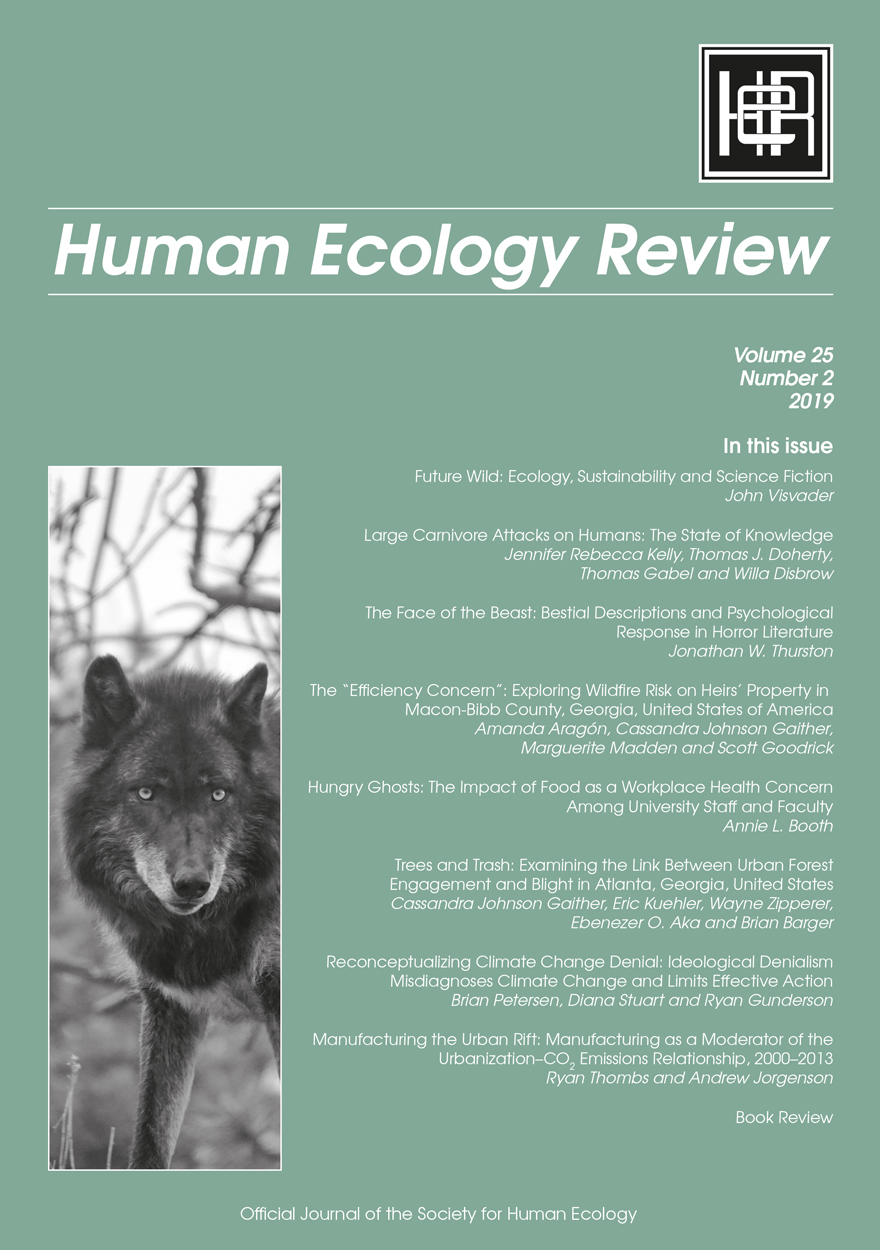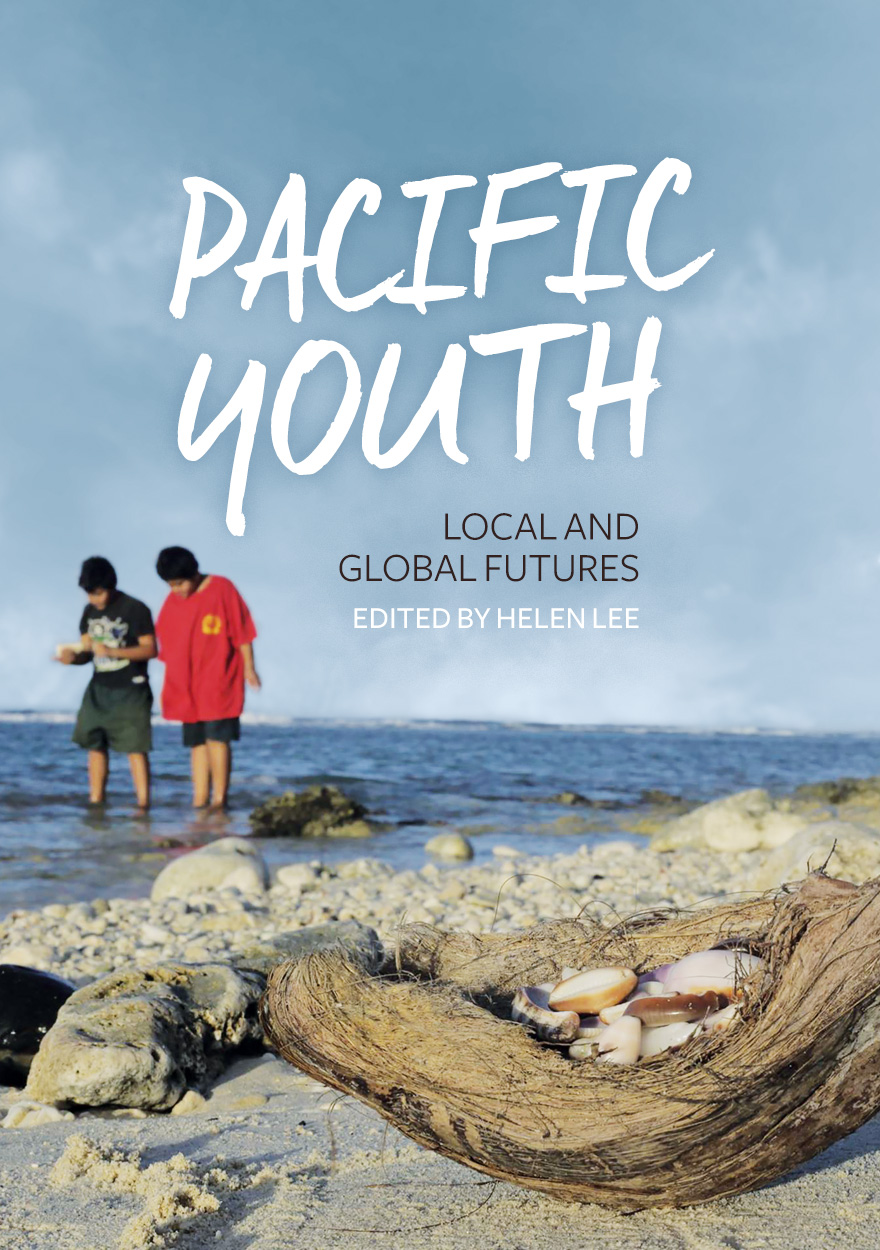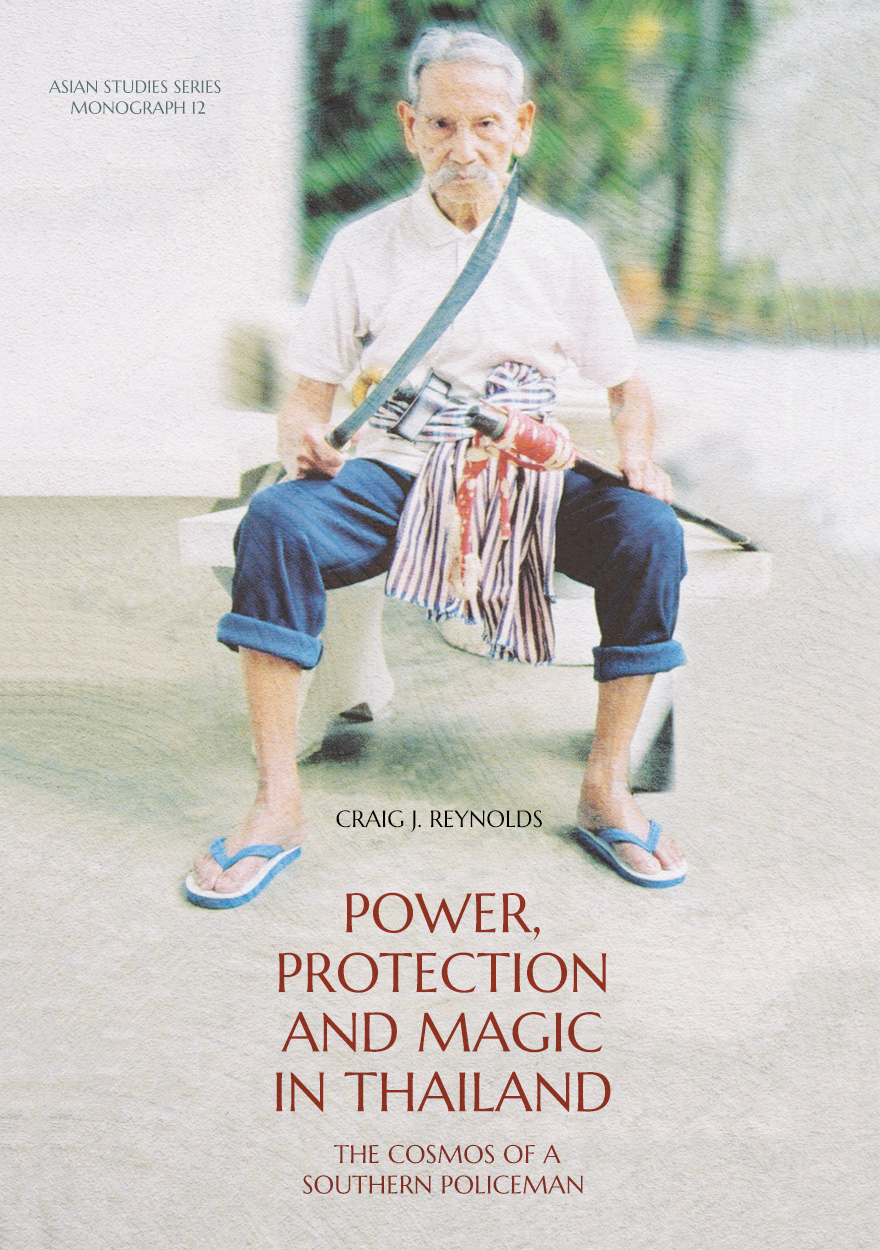Search titles
Displaying results 221 to 230 of 1097.

Human Ecology Review: Volume 25, Number 2 »
Publication date: December 2019
Human Ecology Review is a semi-annual journal that publishes peer-reviewed interdisciplinary research on all aspects of human–environment interactions (Research in Human Ecology). The journal also publishes essays, discussion papers, dialogue, and commentary on special topics relevant to human ecology (Human Ecology Forum), book reviews (Contemporary Human Ecology), and letters, announcements, and other items of interest (Human Ecology Bulletin). Human Ecology Review also publishes an occasional paper series in the Philosophy of Human Ecology and Social–Environmental Sustainability.
Download for free
Not available for purchase

Debating Lapita »
Distribution, Chronology, Society and Subsistence
Edited by: Stuart Bedford, Matthew Spriggs
Publication date: December 2019
‘This volume is the most comprehensive review of Lapita research to date, tackling many of the lingering questions regarding origin and dispersal. Multidisciplinary in nature with a focus on summarising new findings, but also identifying important gaps that can help direct future research.’
— Professor Scott Fitzpatrick, Department of Anthropology, University of Oregon
‘This substantial volume offers a welcome update on the definition of the Lapita culture. It significantly refreshes the knowledge on this foundational archaeological culture of the Pacific Islands in providing new data on sites and assemblages, and new discussions of hypotheses previously proposed.’
— Dr Frédérique Valentin, Centre national de la recherche scientifique (CNRS), Paris
This volume comprises 23 chapters that focus on the archaeology of Lapita, a cultural horizon associated with the founding populations who first colonised much of the south west Pacific some 3000 years ago. The Lapita culture has been most clearly defined by its distinctive dentate-stamped decorated pottery and the design system represented on it and on further incised pots. Modern research now encompasses a whole range of aspects associated with Lapita and this is reflected in this volume. The broad overlapping themes of the volume—Lapita distribution and chronology, society and subsistence—relate to research questions that have long been debated in relation to Lapita.

Civil Society and Transitional Justice in Asia and the Pacific »
Publication date: November 2019
Over the last two decades, civil society has helped catalyse responses to the legacies of violent conflicts and oppressive political regimes in Asia and the Pacific. Civil society has advocated for the establishment of criminal trials and truth commissions, monitored their operations and pushed for take-up of their recommendations. It has also initiated community-based transitional justice responses. Yet, there has been little in-depth examination of the breadth and diversity of these roles. This book addresses this gap by analysing the heterogeneity of civil society transitional justice activity in Asia and the Pacific.
Based upon empirically grounded case studies of Timor-Leste, Indonesia, Cambodia, Myanmar, Bougainville, Solomon Islands and Fiji, this book illustrates that civil society actors can have different – and sometimes competing – priorities, resources and approaches to transitional justice. Their work is also underpinned by diverse understandings of ‘justice’. By reflecting on the richness of this activity, this book advances contemporary debates about transitional justice and civil society. It will also be a valuable resource for scholars and practitioners working on Asia and the Pacific.

Commonwealth Responsibility and Cold War Solidarity »
Australia in Asia, 1944–74
Authored by: Dan Halvorson
Publication date: November 2019
Australia’s engagement with Asia from 1944 until the late 1960s was based on a sense of responsibility to the United Kingdom and its Southeast Asian colonies as they navigated a turbulent independence into the British Commonwealth. The circumstances of the early Cold War decades also provided for a mutual sense of solidarity with the non‑communist states of East Asia, with which Australia mostly enjoyed close relationships. From 1967 into the early 1970s, however, Commonwealth Responsibility and Cold War Solidarity demonstrates that the framework for this deep Australian engagement with its region was progressively eroded by a series of compounding, external factors: the 1967 formation of ASEAN and its consolidation by the mid-1970s as the premier regional organisation surpassing the Asian and Pacific Council (ASPAC); Britain’s withdrawal from East of Suez; Washington’s de‑escalation and gradual withdrawal from Vietnam after March 1968; the 1969 Nixon doctrine that America’s Asia-Pacific allies must take up more of the burden of providing for their own security; and US rapprochement with China in 1972. The book shows that these profound changes marked the start of Australia’s political distancing from the region during the 1970s despite the intentions, efforts and policies of governments from Whitlam onwards to foster deeper engagement. By 1974, Australia had been pushed to the margins of the region, with its engagement premised on a broadening but shallower transactional basis.

International Review of Environmental History: Volume 5, Issue 2, 2019 »
Edited by: James Beattie
Publication date: November 2019
International Review of Environmental History takes an interdisciplinary and global approach to environmental history. It encourages scholars to think big and to tackle the challenges of writing environmental histories across different methodologies, nations, and time-scales. The journal embraces interdisciplinary, comparative and transnational methods, while still recognising the importance of locality in understanding these global processes.
The journal's goal is to be read across disciplines, not just within history. It publishes on all thematic and geographic topics of environmental history, but especially encourage articles with perspectives focused on or developed from the southern hemisphere and the ‘global south’.
Download for free
Not available for purchase

East Asia Forum Quarterly: Volume 11, Number 4, 2019 »
Publication date: November 2019
The idea that countries can pursue prosperity and security as separate streams of the national interest has passed. Economics and security have always been enmeshed, although we assumed otherwise. The nature of the relationship between the two is changing fast. The narratives that surround the change find it difficult to keep up with the facts.
The world has become more multipolar, with remarkable growth outside the established powers in the North Atlantic. And big countries—not just the United States and China, but other G20 members like Brazil, Turkey, Russia and the United Kingdom—have become more nationalist and brazen in asserting what they perceive to be their economic and security interests over those of others. The US–China relationship is increasingly characterised by strategic competition in both the economic and security domains.
At the same time, digital technology has not just transformed products, firms and markets, it has opened them to cyber disruption and attack, resulting in a cross-over of security into the economic and social domains.
This issue of the East Asia Forum Quarterly explores what is happening, why and how to respond to the change. These essays argue for careful thought and active engagement by governments, business and the broader community. Genuine dialogue and problem-solving between the economic and security parts of universities and government is a good first step to frame the problem broadly, keep perspective and find solutions.
East Asia Forum Quarterly grew out of East Asia Forum (EAF) online, which has developed a reputation for providing a platform for the best in Asian analysis, research and policy comment on the Asia Pacific region in world affairs. EAFQ aims to provide a further window onto research in the leading research institutes in Asia, and to provide expert comment on current developments within the region. East Asia Forum Quarterly, like East Asia Forum online, is an initiative of the East Asia Forum and its host organisation, the East Asian Bureau of Economic Research in the Crawford School of Economics and Government in the College of Asia & the Pacific at The Australian National University.
Download for free
Not available for purchase

Pacific Youth »
Local and Global Futures
Edited by: Helen Lee
Publication date: October 2019
Pacific populations are becoming younger and this ‘youth bulge’ is often perceived as a dangerous precursor to civil unrest. Yet young people are also a valuable resource holding exciting potential for the future of island nations. Addressing these conflicting views of youth, this volume presents ethnographic case studies of young people from across the Pacific and the diaspora. Moving beyond the typical focus on ‘youth problems’ in reports by Pacific governments and development agencies, the authors examine the highly diverse lives and perspectives of young people in urban and rural locations. They celebrate the contributions of youth to their communities while examining the challenges they face. The case studies explore the impacts of profound local and global changes and cover a wide sweep of youth experiences across themes of education, employment and economic inequalities, political and civil engagement, and migration and the diaspora.
Contributors to this volume bring many decades of experience of research with Pacific people as well as fresh perspectives from early career and graduate researchers. Most are anthropologists and their chapters contribute to the interdisciplinary fields of youth studies and Pacific studies, offering thought-provoking insights into the possibilities for Pacific youth as they face uncertain futures.

Framing the Islands »
Power and Diplomatic Agency in Pacific Regionalism
Authored by: Greg Fry
Publication date: October 2019
Since its origins in late eighteenth-century European thought, the idea of placing a regional frame around the Pacific islands has never been just an exercise in geographical mapping. This framing has always been a political exercise. Contending regional projects and visions have been part of a political struggle concerning how Pacific islanders should live their lives. Framing the Islands tells the story of this political struggle and its impact on the regional governance of key issues for the Pacific such as regional development, resource management, security, cultural identity, political agency, climate change and nuclear involvement. It tells this story in the context of a changing world order since the colonial period and of changing politics within the post-colonial states of the Pacific.
Framing the Islands argues that Pacific regionalism has been politically significant for Pacific island states and societies. It demonstrates the power associated with the regional arena as a valued site for the negotiation of global ideas and processes around development, security and climate change. It also demonstrates the political significance associated with the role of Pacific regionalism as a diplomatic bloc in global affairs, and as a producer of powerful policy norms attached to funded programs. This study also challenges the expectation that Pacific regionalism largely serves hegemonic powers and that small islands states have little diplomatic agency in these contests. Pacific islanders have successfully promoted their own powerful normative framings of Oceania in the face of the attempted hegemonic impositions from outside the region; seen, for example, in the strong commitment to the ‘Blue Pacific continent’ framing as a guiding ideology for the policy work of the Pacific Islands Forum in the face of pressures to become part of Washington’s Indo-Pacific strategy.

Power, Protection and Magic in Thailand »
The Cosmos of a Southern Policeman
Authored by: Craig J. Reynolds
Publication date: October 2019
This biographical study of an unusual southern policeman explores the relationship between religion and power in Thailand during the early twentieth century when parts of the country were remote and banditry was rife. Khun Phan (1898–2006), known as Lion Lawman, sometimes used rather too much lethal force in carrying out his orders. He was the most famous graduate of a monastic academy in the mid-south, whose senior teachers imparted occult knowledge favoured by fighters on both sides of the law. Khun Phan imbibed this knowledge to confront the risks and uncertainty that lay ahead and bolster his confidence and self-reliance for his struggle with adversaries.
Against the background of national events, the story is rooted in the mid-south where the policeman was born and died. Based on a wide range of works in Thai language, on field trips to the region and on interviews with local and regional scholars as well as the policeman’s descendants, this generously illustrated book, accompanied by short video clips, brings to life the distinctive environment of the lakes district on the Malay Peninsula.

Following the Water »
Environmental History and the Hydrological Cycle in Colonial Gippsland, Australia, 1838–1900
Authored by: Kylie Carman-Brown
Publication date: October 2019
Water reflects culture.
This book is a detailed analysis of hydrological change in Australia’s largest inland waterway in Australia, the Gippsland Lakes in Victoria, in the first 70 years of white settlement.
Following air, water is our primal need. Unlike many histories, this book looks at the entire hydrological cycle in one place, rather than focusing on one bit. Deftly weaving threads from history, hydrology and psychology into one, Following the Water explores not just what settlers did to the waterscape, but probes their motivation for doing so.
By combining unlikely elements together such as swamp drainage, water proofing techniques and temperance lobbying, the book reveals a web of perceptions about how water ‘should be’. With this laid clear, we can ask how different we are from our colonial forebears.



